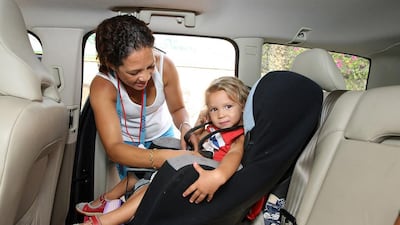Doctors who have treated car accident victims said the new standards to regulate child car seats in the country are vital.
Dr Sripradha Sudarsanam, specialist paediatrician at Medcare women and children, said infants, toddlers and children received life-threatening injuries in car crashes.
"It is the need of the hour. We have seen many children sustain severe head, neck and spinal injuries. They also suffer severe bleeding and abdominal injuries," she said.
Proper labelling of car seats with details of the weight and age of the child it can be purchased for and instructions on fitting the seat would save lives, she said.
"There are accidents due to airbag deployment when a child is held on the lap or in the front seat and on impact, the child is smothered by the airbag or sustains thoracic injuries," Dr Sudarsanam said.
"There have been many instances of car seats that are not latched in properly or were front-facing instead of facing the rear, so the child is not protected. There are so many seats imported from so many different countries. This measure will reassure parents that they can buy safe seats as per their budget and they still do not need to worry about quality because the seats will be checked and inspected before being used. Car seats are also for particular age groups and when written on the seat, then parents will know it's time to change the seat."
_________________
Read more:
New UAE car seat rules 'to stop substandard models flooding the market'
_________________
Parents are often not aware that an accident even at low speed could kill a child, Dr Sudarsanam said.
"Even if a collision happens at 40-50km per hour, it has the same impact as a fall from a height of 30meters," she said.
Dr Sudarsanam advised that education about safety in cars should begin at pregnancy so parents are prepared when leaving the hospital.
"Education is key and should be discussed by the obstetrician. It should start from the time of pregnancy so parents know they require a rear facing seat when the baby is born. Apart from retailers, paediatricians should also talk about the kind of seats that need to be used as the child grows."
Dr Ahmed Mohamed Ghallab, emergency medicine specialist at Zulekha Hospital, said the shift from recommendation to law was critical.
"Now that it's a law people will be obliged to follow it and it will be life saving for infants. Car seats are not a decoration, it's science and there is a universal standard so these must be fixed in a proper way to save lives."
Due to their small build, the impact of an accident on children was greater, he said.
"Their bones are soft so even if the ribs are not broken, the impact will transmit the force to their organs and there can be lung contusion. With no proper seats, their abdominal wall is thin and their liver and spleen are not well protected, abdominal, head injuries and internal bleeding can kill a child. Children are so small in size that without a car seat they can be ejected from the car and face more traumatic injuries."


